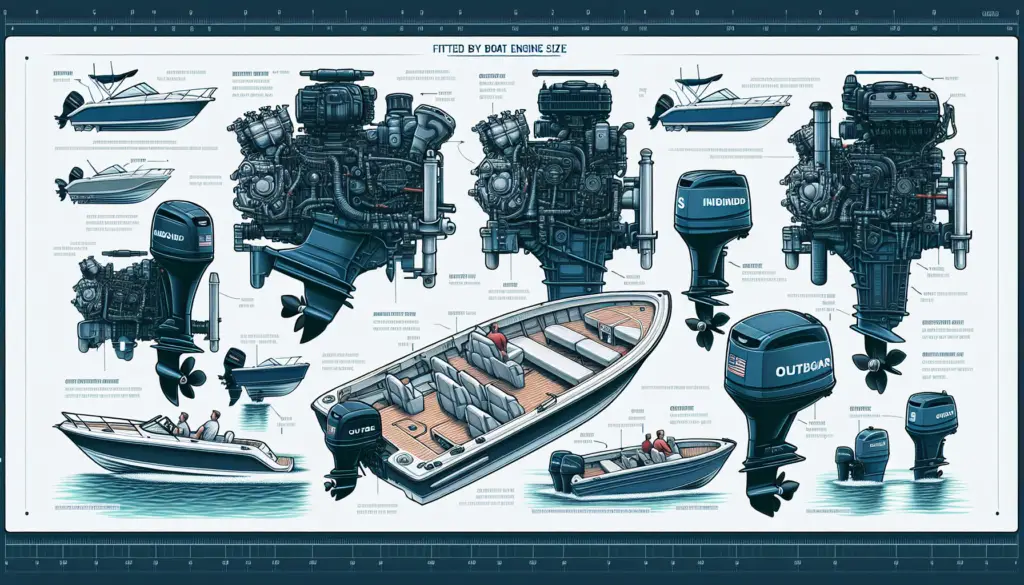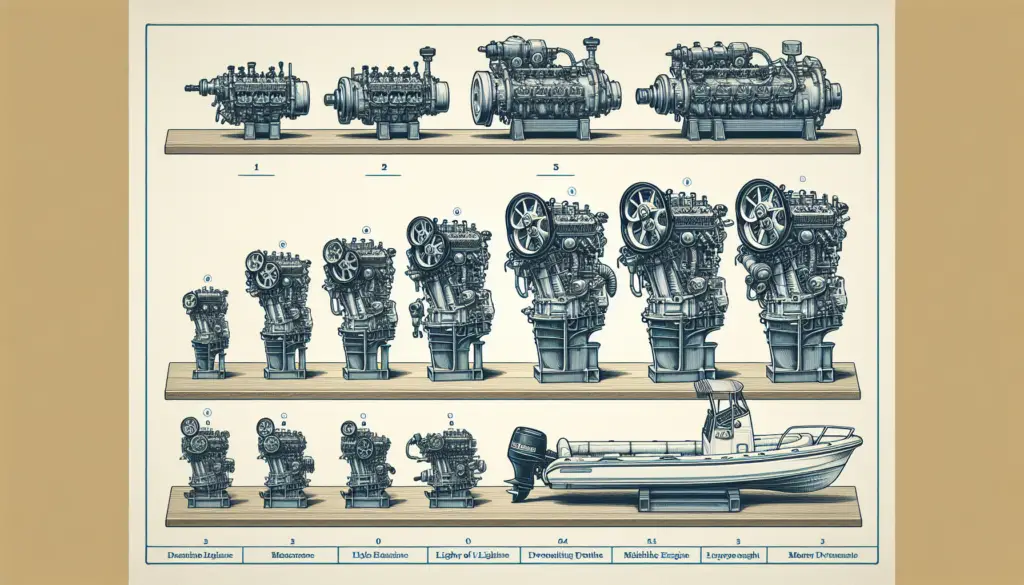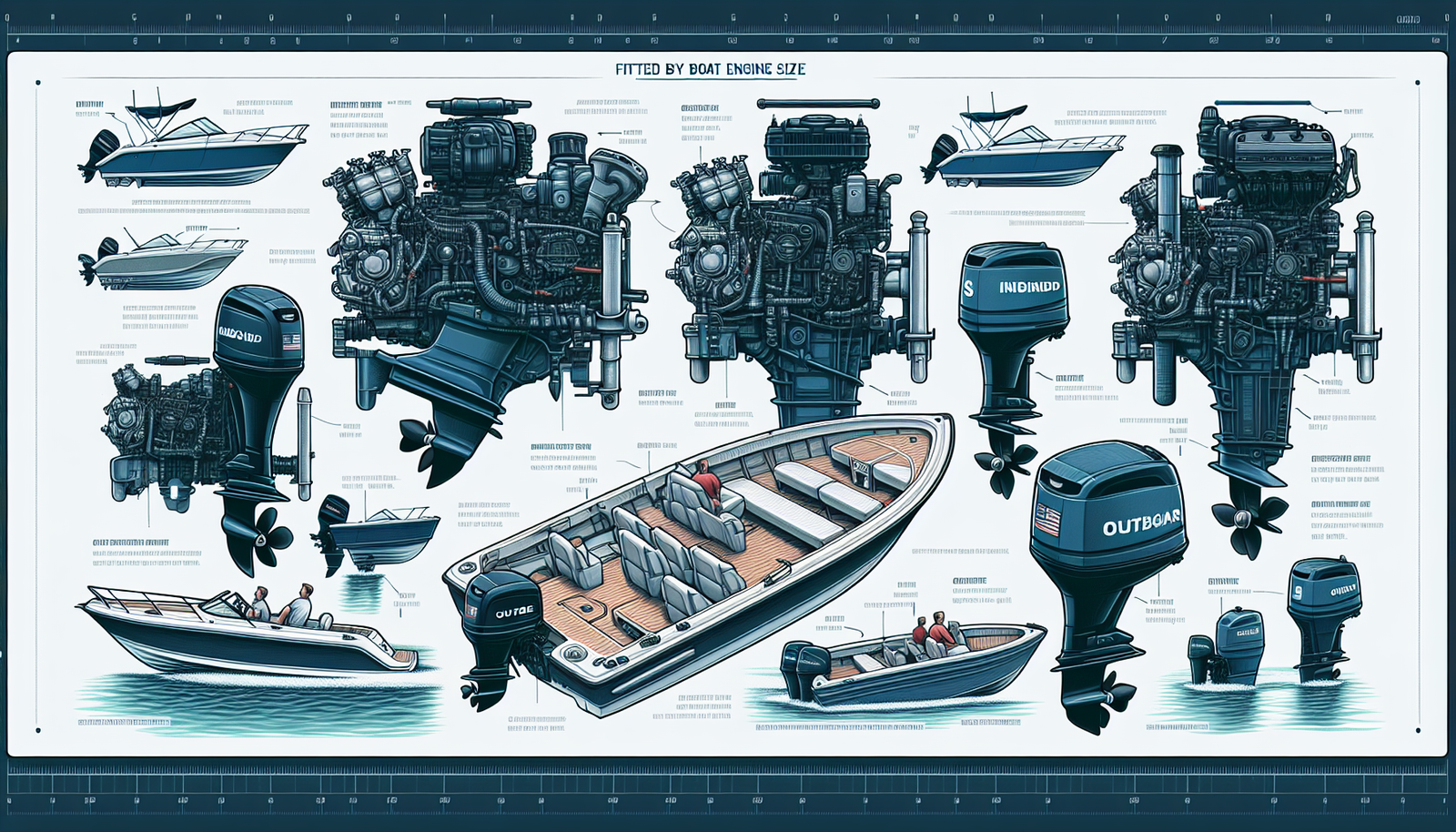So, you’re on the hunt for the perfect boat engine size. It feels like a daunting task, right? Well, don’t fret – we’ve got you covered. “Guide To Choosing The Right Boat Engine Size” provides you a comprehensive and easily digestible set of pointers to navigate through the sea of engine choices. This article will help you understand how the size attribute plays a vital role in engine selection, from boat functionality, fuel efficiency, to your safety at sea. So stick around and learn how to make an informed decision that guarantees a satisfying boating experience!
Understanding Boat Engine Sizes
When it comes to boats, engine size is one of the crucial factors you have to consider. This component directly influences performance, functionality, and fuel efficiency. Let’s dive headfirst into understanding boat engines and how they work.
Basics of boat engine sizes
Boat engine sizes aren’t about the physical dimensions of the engine. Instead, they refer to the power output, usually measured in horsepower (hp). The size of the engine significantly affects the boat’s max speed, acceleration, and load it can tow.
How boat engine sizes are measured
Boat engine sizes are quantified in terms of horsepower. As such, a boat’s horsepower will determine how fast the boat can travel and even how much weight it might be able to pull. The higher the horsepower, the more power the engine can produce.
Common boat engine sizes
There is an array of boat engine sizes available, each catering to different needs. You can find engines ranging from 15 to 150 horsepower for small to medium recreational boats. Yachts, cruisers, and large commercial boats may utilize engines ranging from 500 to over 1,000 horsepower.
Considerations For Selecting Boat Engine Size
Choosing the right engine size is not simply picking the one with the highest horsepower. Several aspects need to be factored into the decision, so let’s walk you through them.
Size of the Boat
The size of your boat is a key determinant in selecting the boat engine size. Larger boats require more horsepower to move effectively and efficiently. Conversely, a small boat with an overly powerful engine can cause reduced control and potential damage.
Intended Usage of the Boat
The purpose of your boat heavily influences the size of the engine you need. If you’re planning to use your boat for fishing or slow, leisurely cruises, a smaller engine might suffice. For water sports or offshore fishing, you’d likely need a larger engine to cater to increased speed and power needs.
Fuel Efficiency and Consumption
More significant engines consume more fuel. If you plan to be out in the water for long periods, then highly efficient, low-consumption engines are your best option. Remember, a larger engine does not necessarily translate to high speed if the fuel consumption is too high.
Budget and Value for Money
Boat engines can be a considerable investment, so it’s essential to balance power and cost. More horsepower generally means a more expensive engine, but it could mean more savings in the long run due to durability and efficiency.

The Relationship Between Boat Size and Engine Size
The correlation between boat size and engine size can’t be ignored. This is rooted in a combination of physics, efficiency, and safety.
Engine size to boat size ratio
There’s no hard-and-fast rule linking boat size and engine size, but specific horsepower-to-weight ratios can guide choices. Smaller boats usually require less horsepower, while larger boats need more to move efficiently.
How the size of the boat impacts the choice of engine size
The boat size impacts engine choice in terms of displacement, load capacity, and desired performance. A bigger boat will need a more potent engine to overcome water resistance, tow loads, and reach desired speeds.
Importance of Resale Value
When choosing an engine size, it’s wise to consider the future resale value of your boat. It could significantly influence your decision.
How engine size affects resale value
Boat engine size directly influences resale value. A boat with a sizable, efficient, and well-maintained engine will likely fetch a higher resale price compared to a similar boat with a smaller or less efficient engine.
Choosing an engine size with resale in mind
For a higher resale value, opt for reputable engine brands reputed to last and generate better power. However, it’s crucial to match it appropriately with your boat’s size for balanced performance and efficiency.

Understanding Horsepower and Torque
Horsepower and torque are integral to understanding boat engine sizes. These factors influence how an engine performs under varying conditions.
What is horsepower?
Horsepower is a unit of measurement denoting an engine’s power output. When it comes to boat engine sizes, it determines how quickly a boat can accelerate and its maximum speed.
What is torque?
Torque refers to the force that causes rotation in the boat’s engine. It’s the torque that allows the boat to have accelerated power when moving from a stationary position.
The significance of horsepower and torque in choosing engine size
Both horsepower and torque play significant roles in choosing your boat engine. More horsepower can offer quicker acceleration and top-end speed. Simultaneously, a higher torque will give the boat improved handling at lower speeds.
Fuel Efficiency and Boat Engine Size
There is a direct correlation between boat engine size, or horsepower, and fuel efficiency.
How engine size affects fuel efficiency
A larger engine will tend to consume more fuel to generate more power, while a smaller engine will use proportionally less fuel but will generate less power. It’s a delicate balance between the power you want and the fuel efficiency you need.
Gas vs. Diesel engines for efficiency
Between gas and diesel engines, the latter is generally more fuel-efficient and often found in larger boats. However, they are more expensive. Gas engines, while less efficient, are more affordable and common in small to medium boats.

Understanding Engine Weight to Power Ratio
Weight to power ratio is another essential aspect to consider when selecting a boat engine.
What is weight to power ratio?
Weight to power ratio refers to the amount of weight that an engine can move with each unit of horsepower. An engine with a higher power-to-weight ratio will be able to accelerate more quickly and reach higher top speeds.
How does weight to power ratio influence engine size choice?
When choosing an engine size, the weight to power ratio can help you determine how effectively the engine will be able to move your boat. If the engine is too small for the weight of the boat, it won’t deliver the required performance.
Direct-Injection Two-Stroke Vs. Four-Stroke Engines
When choosing your boat engine size, you’ll be faced with the choice between two-stroke and four-stroke engines.
Understanding the difference
Two-stroke engines make a power stroke every other stroke, offering more power, lighter weight, and straightforward design. Four-stroke engines, however, make a power stroke every fourth stroke, usually leading to smoother, more fuel-efficient operation, with less environmental pollution.
Choosing between two-stroke and four-stroke in relation to engine size
For larger boats requiring more horsepower, a four-stroke engine will be more useful due to better fuel efficiency and smoother operation. Conversely, smaller boats desiring speed and agility might benefit from the lighter, more potent two-stroke engines.

Environmental Considerations
As responsible boat owners, it’s essential to consider the environmental impact of your boat’s engine size.
Engine size and emissions
Larger engines produce more power but generally emit more pollutants. Advances in modern engine technology have made this less of an issue, but it’s still something eco-conscious boaters should keep in mind.
Choosing an environmentally friendly boat engine size
For a more environmentally friendly choice, smaller engines that still meet your needs are a good option. You can also explore diesel engines or four-stroke engines as these are typically more fuel-efficient and produce fewer emissions.
Maintain and Upkeep of Different Engine Sizes
Lastly, it’s crucial to understand that differing engine sizes will require different levels of maintenance.
Maintenance needs for different engine sizes
Larger engines typically require more regular servicing due to their complexity. They may also need different treatment in terms of fuel additives or specific lubricants. Smaller engines are generally easier and cheaper to maintain.
How upkeep might influence the choice of engine size
Maintenance requirements can significantly influence the choice of engine size. If you’re not inclined to regular, more complex upkeep, then smaller, less intricate engines might be more suited for you. But if you’re prepared for the added work, larger engines could fit your needs better.
In conclusion, the right boat engine size depends on a multitude of factors. It’s a balance of size, speed, torque, fuel consumption, reliability, cost, and environmental and maintenance considerations. Understanding these key concepts will guide you in choosing the ideal boat engine size to enhance your boating adventures.

